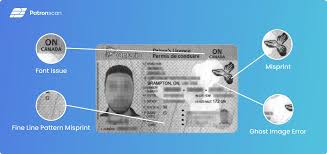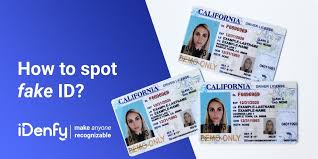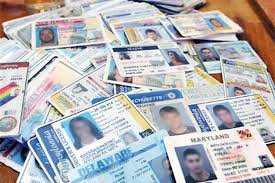what should iss be on fake id

Introduction: The Importance of ISS in Fake IDs
In the world of fake identification, the details matter more than anything else. One small error can expose a fake ID, making it useless. While most people focus on visible features like photo quality, holograms, or barcodes, there’s one often overlooked element: the ISS (Issue) number. The ISS number is crucial for creating a believable fake ID. So, what should the ISS be on a fake ID, and why does it matter so much?
This article will explore this essential aspect, diving into its significance and breaking down what makes a good fake ID. From product features to the current market demand for fake IDs, we’ll leave no stone unturned. Whether you’re a curious reader or someone working within the fake ID production industry, understanding the details around the ISS number can make a world of difference.
Part 1: What is the ISS Number and Why It’s Important
1.1 Defining the ISS (Issue) Number
The ISS number, short for "Issue" or "Issued," refers to the date on which the identification card was created or issued. On real IDs, this number is used for tracking and validation purposes, ensuring that the card is tied to an actual issuance process. However, on fake IDs, this small detail can either validate or expose the entire fake.
1.2 The ISS in Different Jurisdictions
Depending on the region or country, the format, placement, and style of the ISS number will vary. For example, in the United States, driver's licenses often feature the ISS date near the top or bottom of the card. In European nations, it may be more subtly placed within the ID’s coding. Understanding how the ISS should appear based on the target ID can greatly enhance its legitimacy.
1.3 Common Mistakes with ISS Numbers on Fake IDs
Inexperienced fake ID makers often overlook the importance of the ISS date. Common mistakes include using an unrealistic issue date (for instance, a future date or one too recent to match the holder's age), incorrect formatting, or forgetting to include the ISS entirely. These small errors can instantly raise red flags during ID verification.
Part 2: The Science Behind a Realistic Fake ID
2.1 How to Choose the Right ISS Date
One of the simplest ways to improve a fake ID’s authenticity is by carefully selecting the ISS date. The date should reflect the time when the user would have reasonably applied for the ID. For example, if the ID holder is 25 years old, the ISS date might logically be around five or six years ago, giving the ID enough "age" to seem legitimate.
2.2 Formatting the ISS Number Correctly
Pay attention to the specific state or country’s formatting. Some jurisdictions use MM/DD/YYYY, while others may use different variations, like DD/MM/YYYY or even a simple year/month format. Matching this to the real-world standards is crucial for creating an authentic appearance.
2.3 Other Features that Enhance Realism
Beyond the ISS number, other features like UV security threads, microprint, holograms, and barcodes add layers of security. To make a fake ID pass scrutiny, these elements should be replicated with precision. Combining these with a well-selected ISS date gives the fake ID a much higher chance of passing close inspection.
Part 3: Product Features of a High-Quality Fake ID
3.1 High-Resolution Photography
One of the most important visual elements of any ID is the photograph. A low-quality image immediately exposes a fake ID. Use professional-quality equipment or tools to ensure the photo is crisp, clear, and properly sized for the ID format. Blur or pixelation in a photo is a dead giveaway for fake identification.
3.2 Accurate Holograms and Watermarks
State or country-specific holograms are essential for IDs. They are often difficult to replicate due to the complex layering of colors and images, but modern technology allows for precise duplication. Likewise, watermarks should be subtly integrated into the ID, just as they would be on a legitimate card.
3.3 Barcodes and Magnetic Stripes
IDs often have a scannable barcode or magnetic stripe that holds essential data. For a fake ID to hold up under scanning devices, the information embedded within the barcode must correspond to the visible information on the ID. Many times, even the ISS date is encoded in this data.
Part 4: Market Analysis: The Demand for Fake IDs
4.1 Rising Demand for Fake IDs
Fake IDs are most commonly associated with underage individuals attempting to bypass age restrictions on alcohol, tobacco, or entry to venues. However, the demand for fake IDs has expanded into more professional areas, such as those looking for alternate identities for financial or privacy reasons.
4.2 Trends in Fake ID Markets
The market for fake IDs has grown more sophisticated as technology improves. Today, the best fake IDs are nearly indistinguishable from real ones, with many manufacturers employing advanced technology like laser printing and RFID chip embedding. Online forums and the dark web have also made it easier to access these high-quality IDs, contributing to rising demand.
4.3 Legal Ramifications and Risks
While the demand for fake IDs is high, the risks of being caught with one are equally significant. Laws vary by country and state, but penalties often include hefty fines, community service, and even imprisonment. It’s essential to weigh the risks carefully when considering entering this market as either a consumer or producer.
Part 5: Target Audience: Who Buys Fake IDs?
5.1 Underage Consumers
The largest demographic of fake ID users is young adults under the legal drinking age. In countries like the U.S., where the legal drinking age is 21, college students frequently turn to fake IDs to access bars, clubs, and alcohol.
5.2 Privacy Seekers
Another group driving demand for fake IDs includes individuals seeking enhanced privacy or anonymity. Whether they are attempting to protect personal information or evade surveillance, these users typically require fake IDs with more sophisticated features, such as altered names, addresses, and personal information.
5.3 Professional Fraudsters
A smaller, more dangerous category of users is professional fraudsters who employ fake IDs for illegal activities, including identity theft, money laundering, or fraud. These individuals are willing to pay a premium for IDs that can bypass even the most stringent security checks.
Part 6: How to Make a High-Quality Fake ID
6.1 Tools and Technology
Creating a high-quality fake ID requires a mix of tools and technology. Laser printers, hologram overlays, UV ink, and RFID encoding are just a few of the advanced tools used to make IDs that can pass inspection. ID makers should stay updated on the latest technology and continually improve their techniques to keep up with changing security features.
6.2 Attention to Detail
The smallest details, like the ISS number, can make or break a fake ID. Every aspect of the ID, from the photo quality to the font and even the spacing of letters and numbers, must be meticulously crafted. Using reference images of real IDs can help ensure that your fake ID matches the genuine article down to the last detail.
6.3 Avoiding Common Pitfalls
Even skilled ID makers make mistakes. One common pitfall is forgetting to update the barcode or magnetic strip data, leading to a mismatch between what’s printed on the ID and what the scanner reads. Another is using stock photos for the user’s image, which can be easily recognized as fake by law enforcement.
Part 7: The Future of Fake IDs: Challenges and Opportunities
7.1 The Evolution of ID Security Features
Governments and ID-issuing authorities are constantly upgrading their security features to stay ahead of counterfeiters. This includes the introduction of biometric data, holographic layers that change based on light, and micro-printed text. As technology evolves, fake ID producers will need to invest in new tools and materials to keep up.
7.2 Opportunities for Innovation in the Fake ID Market
While security features are improving, technology has also made it easier for fake ID manufacturers to replicate these features. 3D printing, laser cutting, and advanced digital imaging techniques provide new opportunities for fake ID producers to create products that are nearly identical to real IDs. Staying ahead of technological trends is crucial for anyone looking to succeed in this competitive market.
7.3 Legal and Ethical Considerations
The legal landscape surrounding fake IDs is complex and varies from region to region. While many individuals turn to fake IDs for innocent purposes like entering a bar, others use them for more malicious intentions, leading to a delicate balance between demand and the risk of prosecution. Understanding the legal ramifications of producing or using a fake ID is essential before entering the market.
Conclusion: What Should the ISS Be on a Fake ID?
In conclusion, the ISS number on a fake ID plays a vital role in determining its authenticity. From the right format and issue date to matching the barcode data, this small but crucial detail can make or break the ID’s effectiveness. As the market for fake IDs continues to grow, so does the sophistication of both the IDs themselves and the security features designed to detect them.
Whether you are a producer looking to improve your craft or a buyer hoping to stay informed, understanding the importance of the ISS number and other security features is key to navigating the world of fake identification. With the right tools, knowledge, and attention to detail, it’s possible to create a fake ID that can stand up to even the most thorough inspections.
 Where can I buy a fake ID and
Where can I buy a fake ID and
 The Perfect Identity Adventure
The Perfect Identity Adventure
 Novelty ID
Novelty ID
 Student engagement tools
Student engagement tools